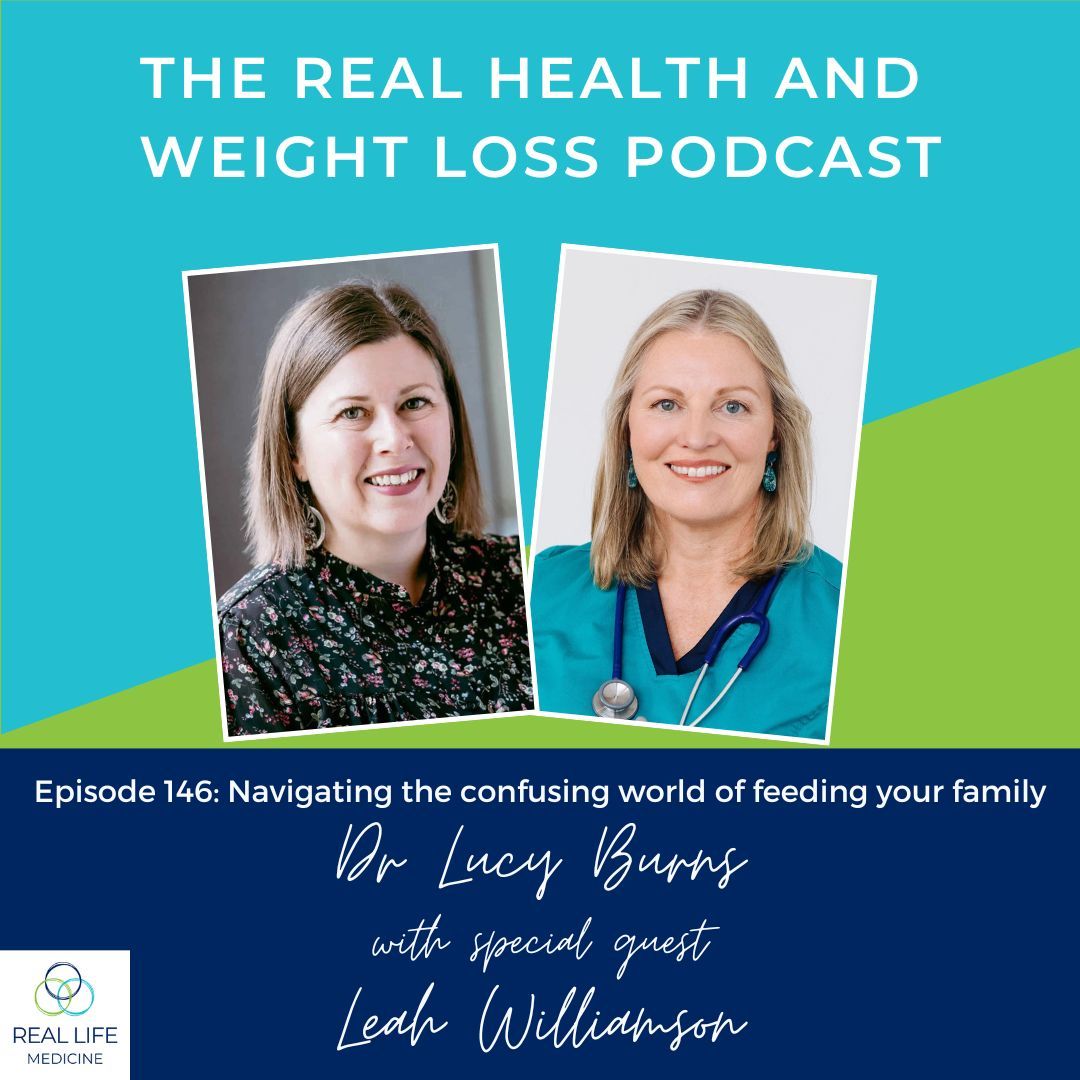
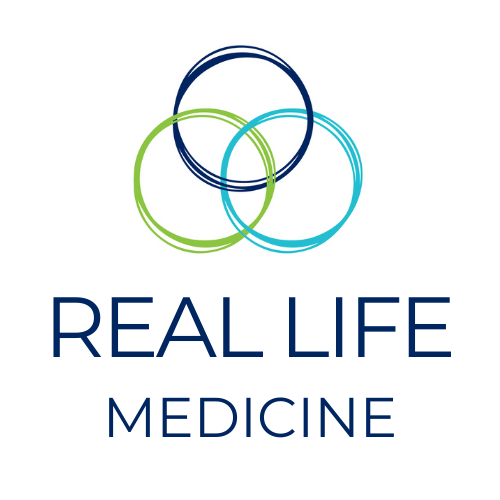
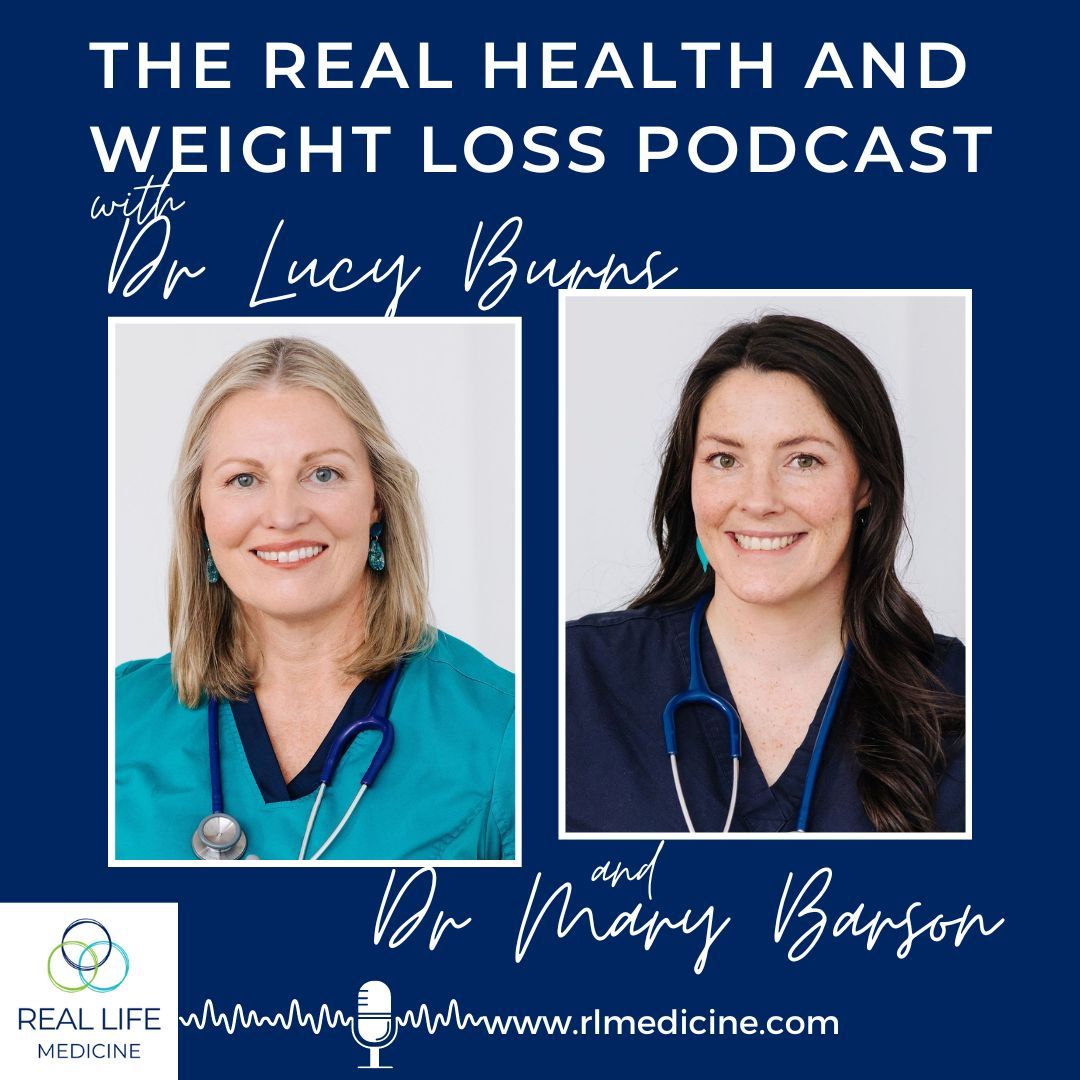
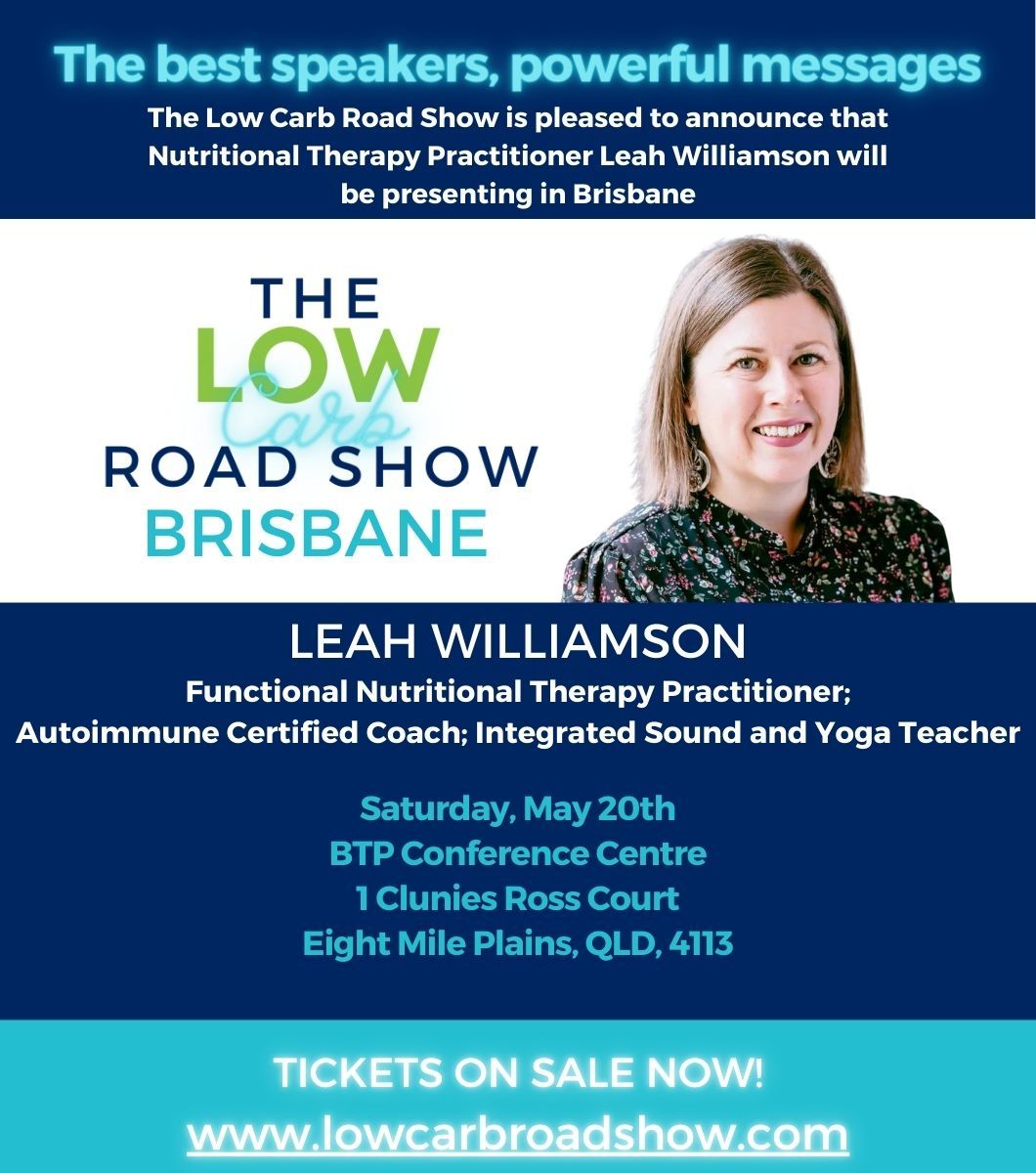
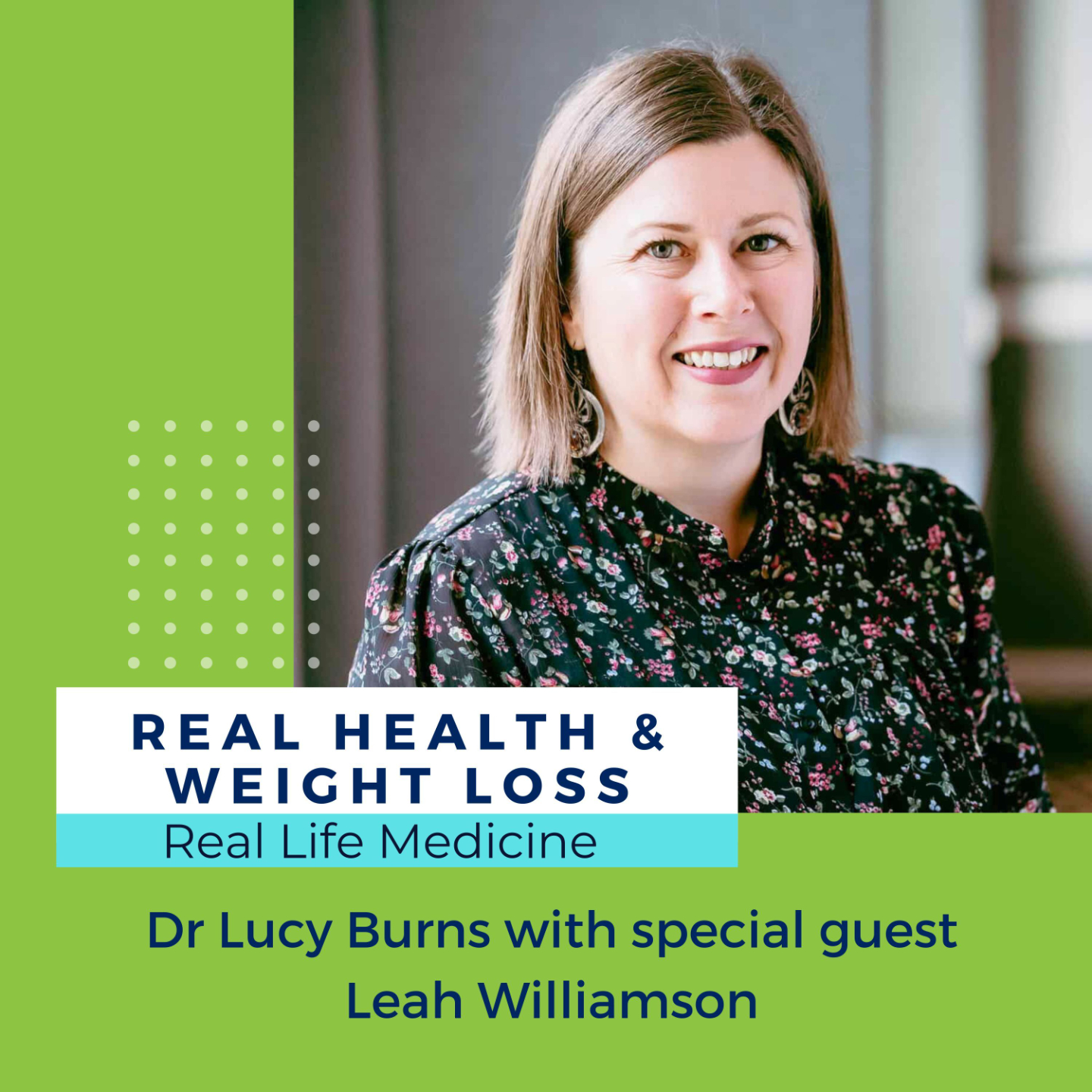
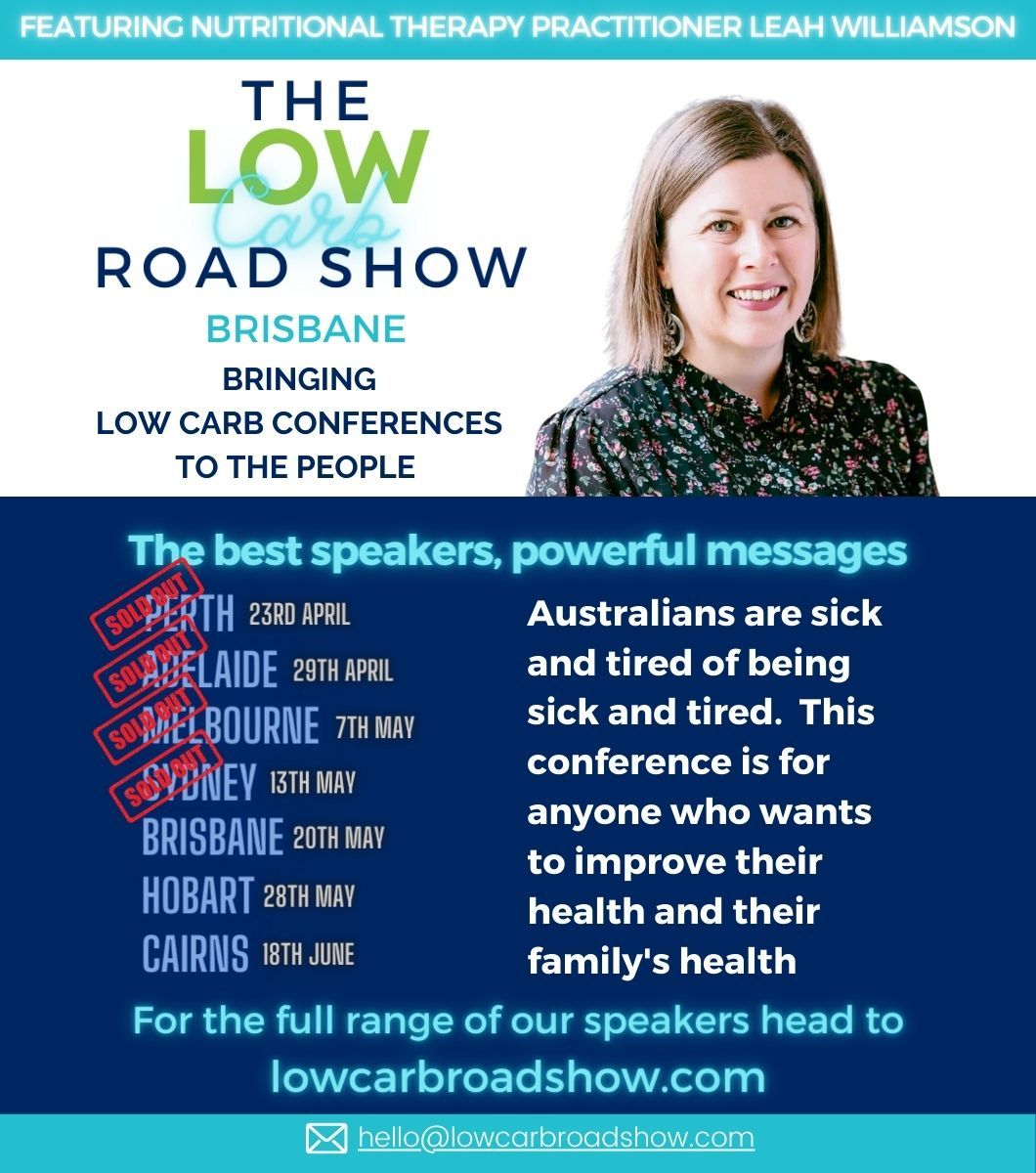
Episode 146: Show Notes
Focus on what feels right for you: When moving to, or living, a real food, low carb lifestyle, Leah’s advice is to consider your own preferences and unique biology, without being influenced by what others are doing or saying. It’s important to get information from reliable sources but test things out on yourself and see how you feel.
Nutrient density: Seeing food in terms of its nutrient density, rather than its label of “low carb”, “paleo”, “real food”, “keto”, helps many people move away from diet dogma. Although labels can be useful, focussing on nutrient density can remove the pressure of following a specific diet, and nutrient-dense foods are generally low in carbs and provide the body with the essential nutrients it needs to function optimally. “Nutrient dense foods give life to every cell in your body, and are full of the vital nutrients the body needs to thrive and survive and have energy.”
Your body loves you: It's always trying to bring you back to homeostasis, just trying to put you back into the correct state. So it's doing whatever it can with the resources that it has to keep you alive. And sometimes that can feel like the body is rejecting you. But it’s not, it's actually trying to be helpful and save you.
Simplicity is key: Avoid unnecessarily overcomplicating things! If you have tried a keto diet involving coffee and butter in the morning, or fasting until midday, and it’s not working for you, you can stop. There are so many other approaches to consider. The main pillars Leah recommends are to reintroduce nutrient dense foods back into the diet, ignore the chatter surrounding ketones, keto, low carb products, and keep things simple!
It’s understandable if you are overwhelmed: While convenience can be helpful, it can also be detrimental to our health if we are constantly choosing highly processed, hyper-palatable foods over nutrient-dense options like vegetables, meats, and healthy fats. The sheer amount of information and conflicting messages about what constitutes a healthy diet can really make it difficult to make informed choices. It's easy to feel overwhelmed by the noise and be swayed by marketing, packaging, influencers, advertising, and even our children's demands in the supermarket. To navigate this complexity, try to look back to food cultures and traditions and rediscover the value of cooking from scratch, eating together as a family, and choosing real, wholesome foods. This doesn't have to be time-consuming or difficult; there are many quick and easy meals that are delicious and nutritious.
Reconnect with food traditions: There are some simple actions we can take to filter out the external noise. It all goes back to the basic customs, such as sitting down and taking a breath before eating, giving thanks before a meal, in a non-religious way, expressing gratitude for the food and the person who prepared it. Eating is not just about filling our stomachs. “Food is joy, and it’s love. And it’s memories.” Why rush through the experience? Why consume food that lacks nutrients and tastes like cardboard? Take the time to sit and really enjoy the food that you are eating. By returning to these traditions, we can improve our own health and our family’s health.
Connect with your family: The goal is to move away from a culture where the mother makes her own diet meal, and makes separate meals for their children and partner. It is possible to have everyone eating the same delicious, nutritious food while minimising time in the kitchen and still making nutrient dense, beautiful meals. Leah helps parents find what works best for their family by minimising stress around mealtimes, addressing food intolerances, and applying a bio-individual approach that works for everyone.
Leah on Instagram:
https://www.instagram.com/nourishingconversations/
Buy your tickets to Low Carb Road Show Brisbane to hear Leah's presentation!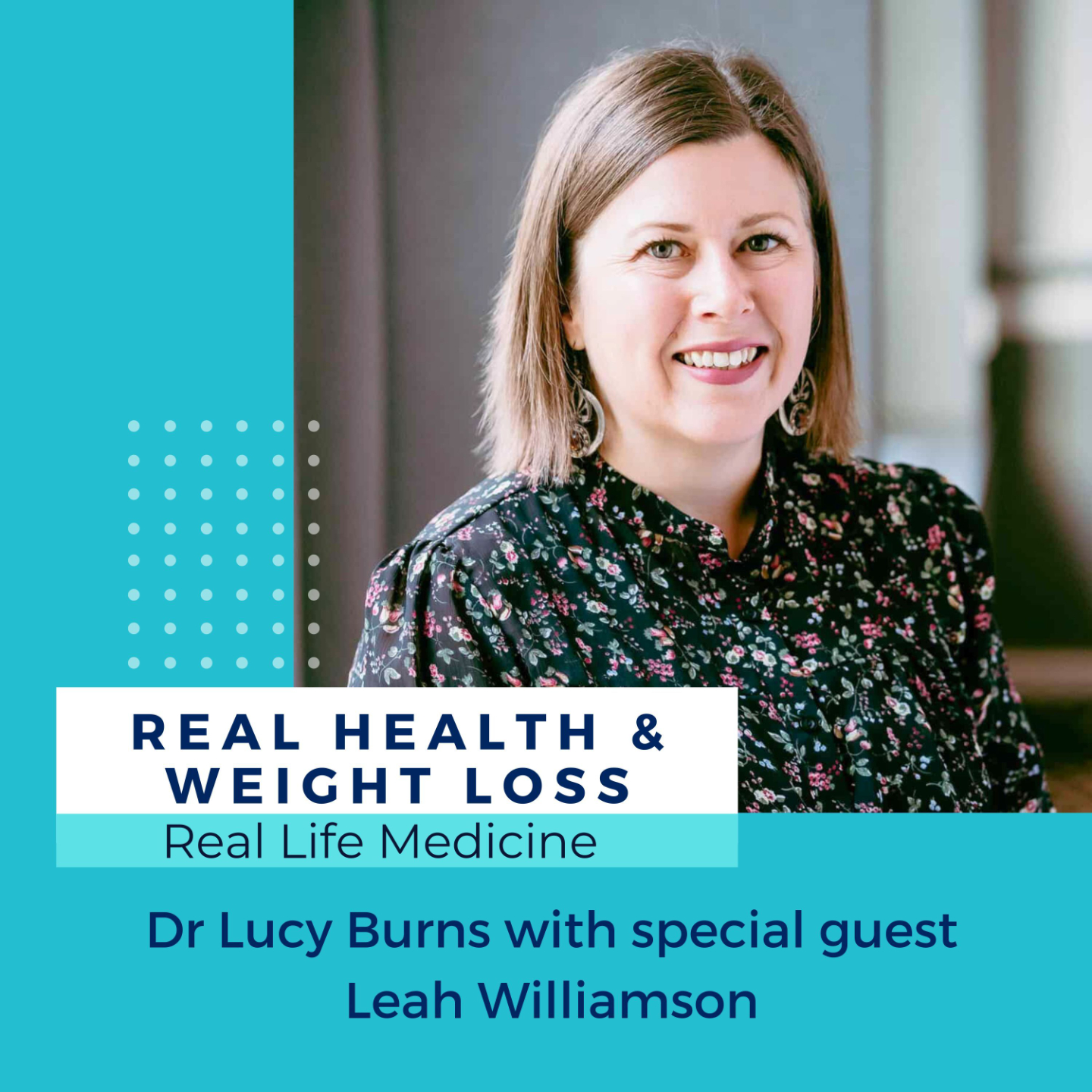
Transcription:
Episode 146
Dr Mary Barson: (0:11) Hello, my lovely listeners. I'm Dr Mary Barson.
Dr Lucy Burns: (0:15) And I'm Dr Lucy Burns. Welcome to this episode of
Both: (0:20) Real Health and Weight Loss!
Dr Lucy Burns: (0:23) Hello my gorgeous friends. I am super excited. I'm always excited, sometimes I feel like a little puppy, but I have another fabulous guest to introduce you today. Her name is Leah Williamson. She has been in the low carb community for a very long time, works as a nutritionist, and has an Instagram account called Nourishing Conversations which already draws me in. I love the idea of nourishing, I love the idea of conversing. So I'm super thrilled to welcome head to the podcast today. Hi, Leah!
Leah Williamson: (0:57) Hello, and thank you, I'm excited too. I'm like a little puppy as well.
Dr Lucy Burns: (1:01) I know. And it's so interesting, because for me, I just, like somebody said to me, Do you ever get sick of talking about this stuff? And I go, No, no, I don't. Because all, so often we just see people's lives changed simply by changing what they eat. And I just love that.
Leah Williamson: (1:21) It is. it's so exciting to hear all the different stories of how people got to where they are. And that's in fact how I kind of started everything back in the day was listening to people's stories. And I was like, We need to get a group together to get everyone together and, and share our stories of all these amazing journeys. Because back then, when we first started, it was just like, nothing around. No one had really heard of it. And we were like these strange people going into cafes and asking for long blacks, and then all of a sudden pulling all these weird things out of our handbags. Almond milk and strange things to put into our coffee and people you know, and now look, you can get it anywhere. So yeah.
Dr Lucy Burns: (2:03) Oh, absolutely. And if you ask for, you know, a hamburger with no bun, you’re no longer stared at like you've got two heads. But two things I love about that. One is I love that you just brought up the idea of having community and connection because I think you're right. It's really, really important. And it's certainly one of the things that we’re really encouraging in the Low Carb Road Show, is to have connection and conversations. And it will be a conference where you're not going to just go there, sit in a row and not speak to anybody. So you know, if you're super shy, you don't have to worry, there'll be someone there who you'll be able to chat with. So I love that.
Leah Williamson: (2:41) Yeah, come and talk to me. I love a chat, anytime. That's why I'm Nourishing Conversations. And yeah, I will talk to you for as long as you want me to talk to, maybe you might have to tell me to stop.
Dr Lucy Burns: (2:53) I know I love it. I love it. And I love that, you know, and I love you. Because you're so friggin warm and friendly. And you know, inclusive. And I think those sorts of qualities are really important. Because sometimes people start this lifestyle, and they get a bit worried and they get judged by other people in their community. So, you know, what are some of the things that you would talk to people about? If they say , Oh you know, I don't know, I don't know about this? Everyone tells me I'm gonna kill myself by eating, you know, chicken with the skin on it?
Leah Williamson: (3:21) Yeah, well, I would probably tell people to really think about what feels right to them and their own bio individuality without worrying about what other people are saying. Obviously, you want to take some caution and do your research, but you want to test it on yourself and see how that feels. And I feel like I focus a lot on nutrient density, rather than labelling anything. I do live in the low carb world. I live in the Paleo world, the Real Food world, and keto world, and I am aware of the labels. And sometimes the labels have a place and they're good. And, you know, it can help you to describe something much easier. But I like to describe the way that we eat in terms of nutrient density, because that can really take the diet dogma away from what you're doing, and take that pressure off you. And if you're choosing nutrient dense foods that, you know, give life to every cell in your body and all those vital nutrients that the body needs to thrive and survive and have energy, then you will always be healthy, be will, and if you look at the foods that are nutrient dense, they're pretty much all low carb anyway.
Dr Lucy Burns: (4:28) Yeah, I love that. I do love that. And you're right. And I think that's part of the problem with labels. Like, if people hear the label keto, they just think that people are like, basically they're living on coffee with butter and bacon and eggs. And that's all you're doing. And obviously we know that there's a lot more to it than that. Well, there's a lot more and a lot less, like it doesn't have to be hard, does it? That's right.
Leah Williamson: (4:51) I'm all about simplicity as well. So not over complicating anything. And I do have a lot of clients that come to me who have been trying a ketogenic diet, in terms of what they've seen on the internet, or what they've seen other people doing, and it is coffee and butter in the morning, and were fasting until midday or fasting for a couple of days, which is all fine when it works well for you. But if it's not working for you, it's not serving you, then why are you doing it that way? There's many other ways to come at this. And so I feel like just, you know, getting those nutrient dense foods back into the diet, taking the dogma away from, you know, having to have ketones, keto products, low carb products, you know, just keep that simplicity. I like to often think about it, and here's a little secret that I like to tell people,
Dr Lucy Burns: (5:39) Oh, I love a secret.
Leah Williamson: (5:41) If you just choose one protein for your plate, two to three veggies and one fat source, you've already got a nutrient dense, low carb meal on your plate.
Dr Lucy Burns: (5:52) Indeed, you’re right, and I always say to people, it's not your fault, we've outsourced our, our intuition we're following you know, we've been following diet plans, meal plans, counting points, counting carbs, counting macros, to the point where we actually don't know what to eat anymore. And when you just come back to that simple simplicity, and then it does become easy.
Leah Williamson: (6:16) And I do think that's because today we're in a world, which is really absence of our food cultures and traditions in today's society. We live in a world that's full of convenience, which can be helpful in some terms, and I'm not discounting that. But then it can also be, you know, not serving us in the best way in other terms as well. So if I'm always choosing frozen, well, you know, some frozen foods got that hyper palatable frozen pizza meals, you know, all the time, and I'm not getting those lovely, nutrient dense vegetables and meats and good quality fats. I'm really not choosing the best foods for health, and then I'm bombarded with so many different things so then I don't know where to turn. I’m like, one radio source is telling me this, one podcast is telling me this, one internet, online is telling me this. I don't know what to do, I can't, it's really hard to decipher through all the noise, and influencers telling me to go this way. The kids are in the supermarket with you and they're telling you to pick these things off the shelf, because it's got healthy written all over it. It's just really hard to decipher what works best in today's world. And I think that if we go back to food culture, and looking at our traditions in the traditional way that we used to eat the coming together to sit down as a family to eat, the cooking together, the cooking from scratch, the cooking of the real foods, you know, spending that time. And it doesn't have to be laboursome, we can find quick and easy meals that way. I feel like if we return to some of those traditions, we’ll be in a much better place for our health and for society in general, as a community.
Dr Lucy Burns: (7:50) Ah, I could not agree more. And you know, it's so interesting. So we have a number of blogs, the one that is clicked on the most, or searched for, is a blog we wrote called Is Up and Go healthy? And you know, you and I both know that it's processed rubbish. But what's happened with Up and Go, is that not only have we been convinced that we don't have time to cook a breakfast, we're also marketing, they're convincing us we don't even have time to eat it. So here's this product that you can just grab and go, and eat it in the car or drink it while you're walking to the bus or whatever. And therefore you don't have to dedicate a single minute to this. And it's like, oh that comes at a huge price.
Leah Williamson: (8:35) It does, because where does digestion start really? Most people will say it's in the mouth, but it's not. It's actually in the brain. And it's when we start thinking, just you know, having that emotion of like, what am I going to eat, or smelling that food, that's when our actual digestive system kicks in. And if we are in a sympathetic state, so we're in that fight or flight kind of state, and then we're downing an Up and Go through a straw, not even chewing our food, our whole digestive system hasn't kicked in. It hasn't started the process of digesting properly and that's when we end up with dysfunction around, Oh, my stomach hurts, I can't eat this anymore because I feel like you know, for want of a better term, I've got leaky gut and I can't you know, eat these foods anymore that I once was able to eat. I'm allergic to everything. I can't go to the bathroom anymore because I'm so uptight, and I can't relax, that I can't pass the food through my body which becomes quite toxic. So there's a lot of stuff going on there. And that's why I like to really like reverse it back. Go right back to the beginning. You think digestion starts in the brain, think that first. Okay, so what do I need to do? I need to sit down and eat in a calm manner. That's all I need to do. Sit down.
Dr Lucy Burns: (9:52) Yeah, absolutely. People go, Well, that's obvious, but still lots of people don't do it. But there's actually also you know, science which you've alluded to, but hormones that need to be activated that need to make their way to different parts of our body, to different parts of our brain. Hormones are just messengers but they can tell our body what to do, when to do it.
Leah Williamson: (10:12) Exactly. And then often we reject what's happening in our body, it's like, I'm constipated, or I, my stomach hurts all the time, you know, I must be doing something wrong, you know. And so, with what's going on with all of that is, No, your body's actually working as expected, your body loves you. It's always trying to bring you back to homeostasis. It's just trying to put you back into the correct state. So it's doing whatever it can with the resources that it has to keep you alive, basically. And sometimes that could be feeling like the body is rejecting you, when it's not, it's actually trying to be helpful and save you, basically.
Dr Lucy Burns: (10:53) Yeah, yeah, yeah, absolutely. We need to and again, part of it, we don't, we don't know how to listen to our body.
Leah Williamson: (10:59) That's right. There's a lot of simple things we can do to turn that noise off from, from outside. And it all just comes back to the simple traditions that we've seemed to have lost along the way, like, sitting down then and breathing, to eat, you know, take a deep breath before you eat. Some people, you know, if you're religious, some people like to say grace. We're not really religious in our household, but we still can be thankful for the food that's been provided, you can be thankful for the person that added the meal to you, rather than just shovelling the food into your mouth. Because food is joy, and it's love. And it's memories. And it conjures up so many wonderful memories of the past and the future and the present, really. So why not enjoy that process? Why put things that are like cardboard, with no nutrients, into your mouth in a rushed state while you're running around? When you could take the time to sit and enjoy and really love the food that you're about to eat?
Dr Lucy Burns: (11:59) Yeah, absolutely. I couldn't agree more. And I think that sometimes people say to me, oh, but you know, I love my food. And I go, Yeah, me too. But what I do know, is that if our diet has a lot of processed food in it, processed food is hyper palatable and, and upregulates all your dopamine receptors. Processed foods steals the joy of real food.
Leah Williamson: (12:24) I love that.
Dr Lucy Burns: (12:25) Yeah. And so I go, Wow, just ditch the processed stuff. Yes, my primitive brain, you know, used to really love Maltesers and Tim Tams and, and really, you know, Kingstons, any sugary stuff in particular. But now that I don't have it, I can actually taste all the other things that are in real food.
Leah Williamson: (12:47) Exactly. Which makes like, if you have a carrot, it makes the carrot taste sweet. And you can taste how it actually is meant to be.
Dr Lucy Burns: (12:55) Only yesterday, I was chopping an iceberg lettuce. And I was having a little nibble as I'm chopping it. And Iceberg lettuce is quite sweet. Once it's not competing with Mars Bars. I love it. I love it. So do you also help people, you know particularly those who are looking at you know, helping their family, feeding the family? Is that your jam?
Leah Williamson: (13:18) Yeah, I do. Definitely. I say I'm an expert in feeding the family because I have two children myself and I've managed to keep them alive into tween and teenage hood now. So that was really the reason why I started on this journey, foremost in order to help myself but also, in order to help my children. My son when he was quite young would have any piece of sugar and absolutely go crazy. So that's kind of like what sparked my journey along the way. And so I guess where I come in and help is, I'll help the parents find what works best for them. So how to minimise stresses around mealtimes, how to minimise stresses of foods, where maybe there might be an intolerance or something that they're eating that's not working or serving them for themselves in the children. And then how to take that information that they have, and practically apply that so that they can live this lifestyle in a way that works best for them without having to worry about the noise around them and the pestering of the advertising and the influencers and everything like that. So I really find that nutrient dense bio individual approach that can then be applied and work for the family. Because we see a lot of parents quite often go on this journey for themselves or for their children, but they will tend to just like only feed themselves that food. And it's like, you know, they're making one meal for themselves and they're making another meal for someone else and then another meal. We don't want that. We all want to be eating the same food and we will want to be enjoying the food that we're eating and we want to minimise that time in the kitchen. But we still want to make it nutrient dense and as beautiful as we can.
Dr Lucy Burns: (14:55) Yes, absolutely. I love that. I love that and you know, look I think for some, particularly women, and I'm using myself as an example. You know, I grew up with a mum who was very heavily influenced by diet culture. Spent all her waking hours going to Weight Watchers and buying diet food. So she had her food, which was diet food, and we had the rest. And it's actually, you don't have to eat like that. You can all eat. You know, for us, it's it's real food. So we love the LCRF acronym of low carb, real food.
Leah Williamson: (15:29) Yeah, I love that, too.
Dr Lucy Burns: (15:30) Yeah, and everyone can do that. And if you want to add some real food carbohydrate sources to other people in your family, then you can do that. But you know, you're the bosses.
Leah Williamson: (15:40) Definitely and I think also too, it can be like, the children can feel sometimes, like maybe they're missing out, or, you know, they're not, they're not like eating the same way as their friends are eating. And I know, I went through a phase with my son who was very much like that. He was taking some tuna to school to eat, and the kids were being mean to him about eating tuna. And I just said to him, you know, we eat this way, because it makes you feel good, it gives you energy, and we always have that discussion around it. If you don't want to eat that food, we can find something else that you know, isn't gonna make you feel this way at school. Or you can eat this food, which you know, it makes you feel energetic and not sleepy and all of that. So which would you like to choose? And he's like, Well, I'll keep going with the tuna. I'm like, how about you just don't sit near that person that’s being mean to you?
Dr Lucy Burns: (16:29) Yeah, absolutely. Absolutely. And you know, and it means very early on, kids can learn that eating is not a team sport. That you know, just because one person's having Tiny Teddy's and whatever those roll up things are in their lunch, that you know, you don't have to, and you're not missing out.
Leah Williamson: (16:47) That's right. My son actually, now he's in high school, makes hamburger patties and he will get the mince and make them into the patties himself. Goes out to the barbecue with his dad, barbecues the meat patties, makes up about 10, freezes them, and then each morning before school will defrost one and he'll put a bit of cheese on it, whatever he's having, salad with it or whatever, and has one of those everyday. His open hamburger he calls it.
Dr Lucy Burns: (17:12) I love that. Yeah, I totally love that. I love that. So Leah, you're speaking at the Low Carb Road Show in Brisbane, which we are very excited to have, which is May 20. So for all of our lovely listeners who really want practical advice on how to implement a Real Food Program into your family, make sure you hear Leah speaking. She's, it's going to be powerhouse. She's not just food, like she's holistic. There's a whole holistic care to her way of helping people. So yeah, really, really excited to hear your talk, Leah.
Leah Williamson: (17:47) Thank you. Yes, I'm excited to attend and see everyone. I'm looking forward to chatting with everybody as well.
Dr Lucy Burns: (17:53) Wonderful. So gorgeous peeps, if you want to connect with Leah, as I mentioned, you can follow her on Instagram at Nourishing Conversations, you can come to the Low Carb Road Show where she'll be there and chatting and looking after you. So it'll be wonderful. All the links will be in the show notes. And I look forward to seeing all of you at Low Carb Road Show, hopefully Brisbane, but any of the road shows. And I will catch up with you all next week. Thanks so much for joining us, Leah.
Leah Williamson: (18:21)
Thanks for having me.
Dr Lucy Burns: (18:29) So my lovely listeners, that ends this episode of Real Health and Weight Loss. I'm Dr Lucy Burns…
Dr Mary Barson: (18:36) and I'm Dr Mary Barson. We’re from Real Life Medicine. To contact us, please visit rlmedicine.com
Dr Lucy Burns: (18:47) And until next time…
Both: (18:49) Thanks for listening!
Dr Lucy Burns: (18:51) The information shared on the Real Health and Weight Loss podcast, including show notes and links, provides general information only. It is not a substitute, nor is it intended to provide, individualised medical advice, diagnosis or treatment, nor can it be construed as such. Please consult your doctor for any medical concerns.







